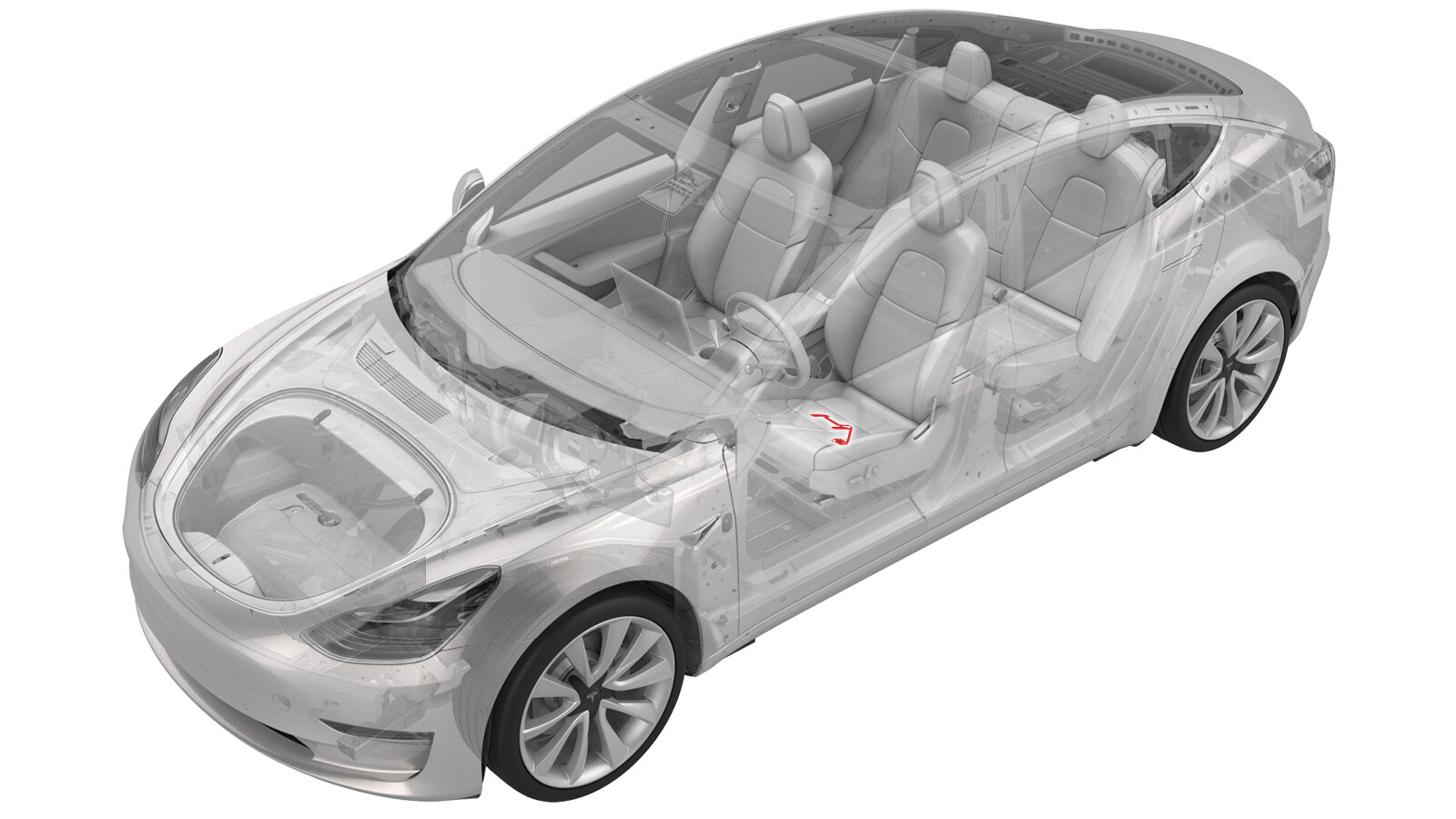Sensor - Resistive Occupancy - Front Seat - LH (Remove and Replace)
 Correction code
20202102
0.60
NOTE: Unless otherwise explicitly
stated in the procedure, the above correction code and FRT reflect all of the work
required to perform this procedure, including the linked procedures. Do not stack correction codes unless
explicitly told to do so.
NOTE: See Flat Rate
Times to learn more about FRTs and how they are created. To provide feedback on
FRT values, email ServiceManualFeedback@tesla.com.
NOTE: See Personal Protection to make sure wearing proper PPE when
performing the below procedure. See Ergonomic Precautions for safe and healthy working practices.
Correction code
20202102
0.60
NOTE: Unless otherwise explicitly
stated in the procedure, the above correction code and FRT reflect all of the work
required to perform this procedure, including the linked procedures. Do not stack correction codes unless
explicitly told to do so.
NOTE: See Flat Rate
Times to learn more about FRTs and how they are created. To provide feedback on
FRT values, email ServiceManualFeedback@tesla.com.
NOTE: See Personal Protection to make sure wearing proper PPE when
performing the below procedure. See Ergonomic Precautions for safe and healthy working practices.
- 2023-05-18: Added a video at Step 9 in Removal part to avoid damage to components and/or personal injury.
Remove
- Remove the driver seat. See Seat Assembly - 1st Row - LH (Remove and Replace).
- Place the driver seat on a clean working surface.
- Remove the driver seat outboard side shield. See Side Shield - Outboard - Driver Seat (Remove and Replace).
- Remove the driver seat inboard side shield. See Side Shield - Inboard - Driver Seat (Remove and Replace).
- Disconnect the heater pad connector, then remove it from the seat underside.
-
Disconnect the electrical
harness from the resistive occupancy sensor connector.
-
Release the clip that
attaches the resistive occupancy sensor to the seat underside, and then
separate the sensor from the seat underside.
-
Release the clips (x3) that attach the seat cushion foam to the seat cushion frame at the front, inboard, and outboard sides.
TIpUse an angled pick to pull the retaining clips down and away from the seat frame.
Figure 1. Other components hidden for clarity -
Lift the front of the driver
seat cushion foam trim, releasing clips and--if present--velcro strips,
until the resistive occupancy sensor is exposed.
Figure 2. Front seat cushion with clips and velcro Figure 3. Front seat cushion with clips -
While wearing cut-resistant
gloves, carefully use a razor blade to separate the resistive occupancy
sensor from the driver seat cushion foam.
WarningAlways wear cut-resistant gloves when using cutting tools.CAUTIONTake care not to damage the sensor harness, seat trim, or other surrounding components with the razor blade.CAUTIONTake care to remove as little foam as possible.
-
From the underside of the
cushion, carefully route the resistive occupancy sensor harness up through
the top of the cushion, and then remove the sensor from the cushion.
CAUTIONWhile removing the harness, take care not to damage the foam.
Install
-
Position the resistive
occupancy sensor on top of the driver seat cushion foam, and then route the
sensor harness through the harness opening in the foam.
CAUTIONWhile installing the harness, take care not to damage the foam.
Figure 4. Resistive occupancy sensor positioned on top of the front seat cushion foam Figure 5. Resistive occupancy sensor harness routed through the bottom of the front seat cushion foam -
Peel the protective backing
off of the resistive occupancy sensor, exposing the adhesive, and then
install the sensor on top of the foam.
NoteAlign the sensor with the indentations on the foam.
-
Pull the driver seat cushion foam trim over the foam, installing all clips and--if present--velcro strips.
Figure 6. Front seat cushion with clips and velcro Figure 7. Front seat cushion with clips - Install the heater pad connector to the seat underside, then connect it.
-
Position the resistive
occupancy sensor harness on the support bracket, and then install the clip
that attaches the harness to the bracket.
-
Connect the resistive
occupancy sensor connector to the electrical harness.
-
Install the clips (x3) that attach the seat cushion foam to the seat cushion frame at the front, inboard, and outboard sides.
Figure 8. Other assemblies hidden for clarity - Install the driver seat inboard side shield. See Side Shield - Inboard - Driver Seat (Remove and Replace).
- Install the driver seat outboard side shield. See Side Shield - Outboard - Driver Seat (Remove and Replace).
- Install the driver seat. See Seat Assembly - 1st Row - LH (Remove and Replace).